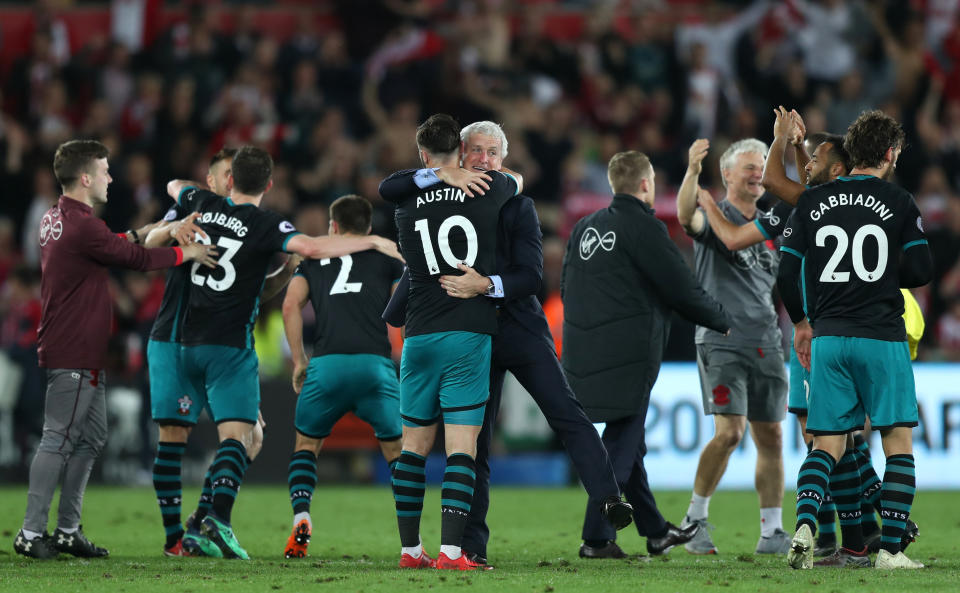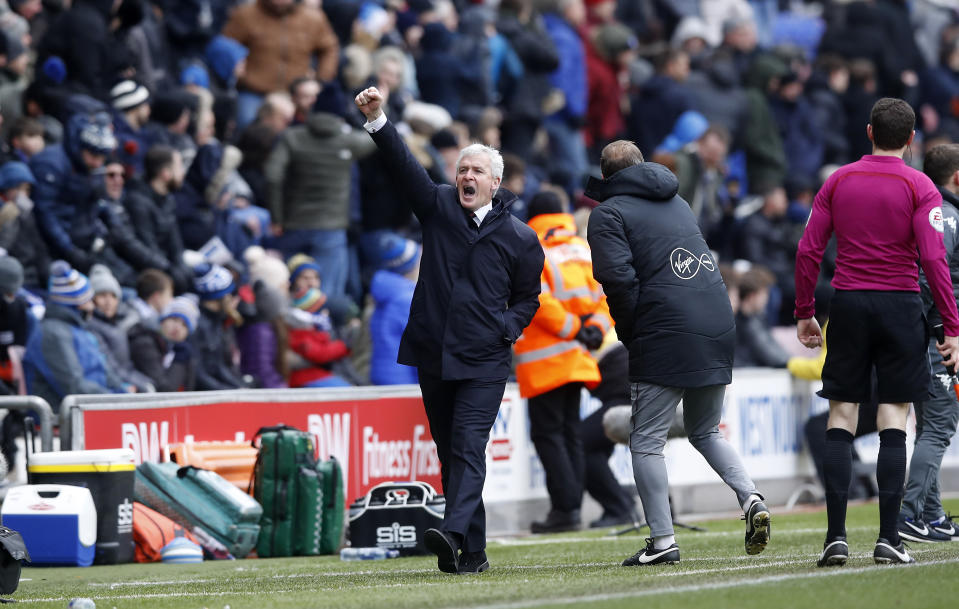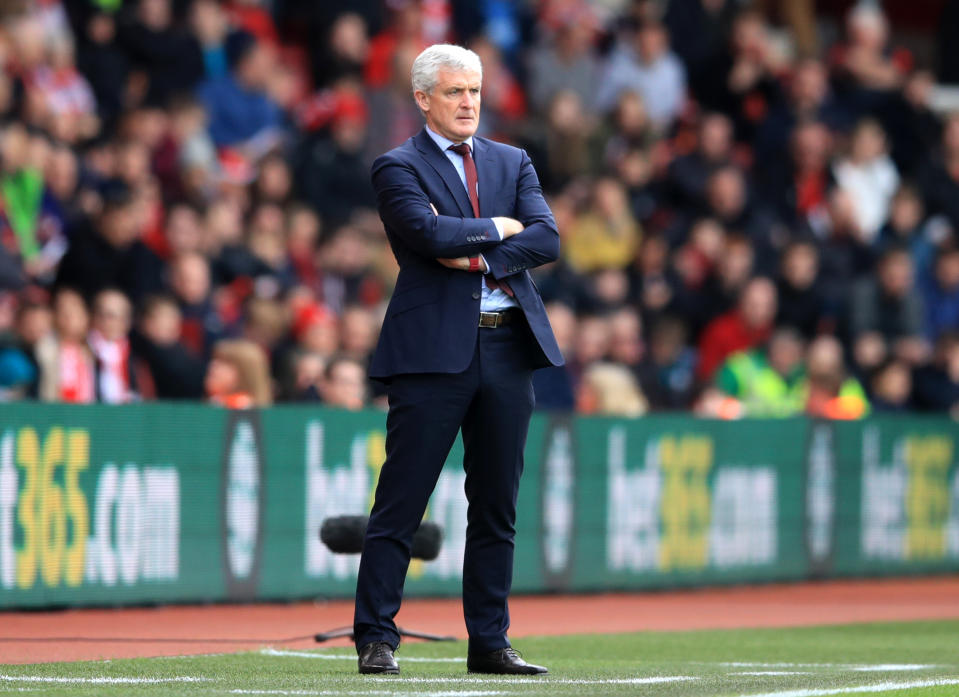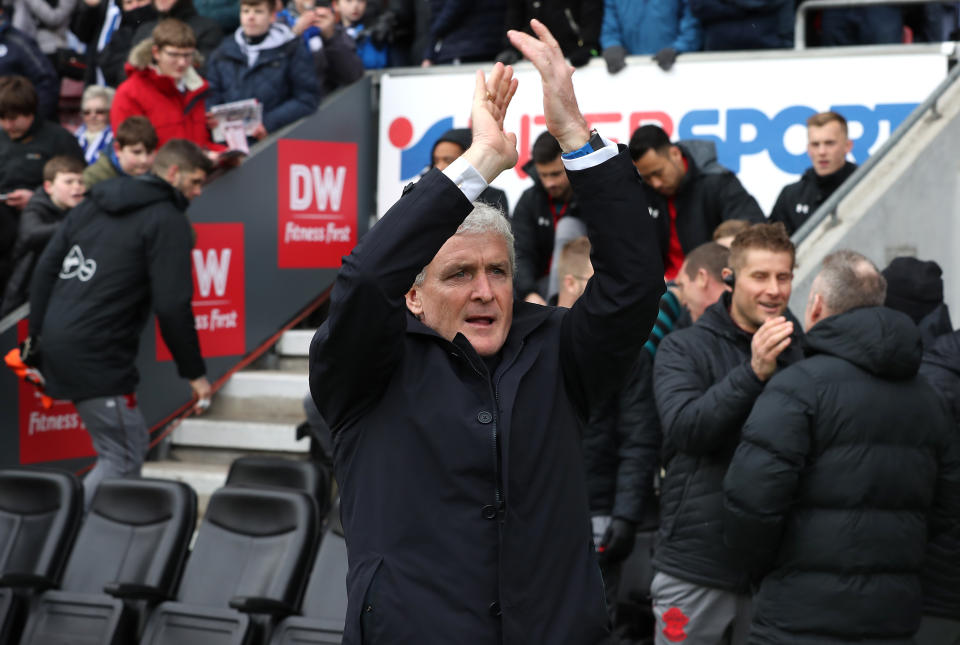Southampton Fan View: Mark Hughes has earned the right to continue

When Southampton eventually pulled the plug on Mauricio Pellegrino’s reign as the club’s first-team manager, very few viable replacements presented themselves.
Saints had just come off the back of a 3-0 away defeat at Newcastle in March, with the team turning in a performance that was nothing short of embarrassing. With the club dangerously poised in 17th place on the Premier League table, Pellegrino was relieved of his duties.
A number of managers were available to Saints at this late stage of the season, but this selection consisted generally of bosses who had been sacked by Premier League clubs earlier on in the campaign. The likes of Slaven Bilic and Marco Silva were touted as potential options for Saints, but the top brass at St Mary’s plumped for Mark Hughes.
READ MORE: Hughes bites back after Stoke City criticism
READ MORE: Gabbiadini goal relegates West Brom and virtually ensures Saints survival
READ MORE: Resurgent West Brom relegated as Southampton beat Swansea
The Welshman had been sacked by Stoke after a torrid first half of the campaign. Having lost five consecutive Premier League games and after seeing the team succumb to a humiliating FA Cup third round exit against Coventry City, the Potters dismissed Hughes.
It seems rather ironic now that Hughes has led Southampton to the brink of survival after roughly eight weeks in charge, whilst Stoke saw their Premier League status taken from them at the weekend under Paul Lambert, months on from Hughes’ sacking.
When Saints confirmed that Hughes would be the club’s new manager on an interim basis until the end of the season, mixed reactions were put forward. Outsiders had made predictions that Hughes could make history, by playing a key part in overseeing two teams’ relegation from the Premier League in a single season.
Saints fans, however, were generally optimistic. Hughes was not a fashionable appointment, nor a desirable one, but at the point of desperation, beggars simply cannot be choosers and this was the case following Pellegrino’s eventual exit.
Hughes made a stuttering start after being thrown in at the deep end with Saints. He saw his first outing end in victory, as the team defeated Wigan Athletic 2-0 away from home to progress to the semi-finals of the FA Cup.

Following this win, though, came his first Premier League game in charge against West Ham, which was nothing short of a catastrophe. Saints were defeated 3-0 by the Hammers in what was a must-win match, with concerns already raised over Hughes’ tactical capabilities, given his decision to play 4-4-2. The team were left completely exposed and were overrun in midfield, consigning Saints to yet more misery.
To his credit, however, Hughes soon acknowledged the prevalent issue in Saints’ season aside from his predecessor, Pellegrino – the central defenders. The Welshman clearly noticed that the team were leaking goals and reverted to a system consisting of five defenders for games against Arsenal and Chelsea.
Although the two aforementioned encounters ended in respective 3-2 defeats, Saints were genuinely able to compete once again and were able to play with the shackles loosened. Lapses in concentration coupled with individual defensive errors contributed to these frustrating losses.
Saints were still left in a world of trouble, however, and a dull 0-0 draw away Leicester City alongside a tepid FA Cup exit at the semi-final stage against Chelsea didn’t fill the supporters with a great deal of confidence.
This led Saints into a ‘do or die’ clash with fellow South Coast outfit, Bournemouth. Failure to win in this game would have effectively seen the club have next to no chance of escaping the drop, but Hughes’ plans finally fell into place and Southampton turned in a spirited performance, resulting in a big three points.
It was an unconvincing display but, finally, three points had been ground out by a Southampton side that had before looked so utterly devoid of confidence and the mental capacity to close out games. Dusan Tadic stepped up to the mark for the first time in the season and led the team, scoring two finely-taken goals to secure a crucial win.
The full-time whistle blew at St Mary’s and the crowd erupted as though a cup final had been won. It felt like the turning point for Saints and it proved to be a late yet timely catalyst for the club’s survival bid.

Southampton were left aggrieved by a 96th minute Everton equaliser in their next outing, with a combination of indiscipline from Maya Yoshida, a lack of defensive intelligence from Wesley Hoedt and incompetence from referee Jon Moss leaving the Saints to settle for a 1-1 draw at Goodison Park.
The biggest game in Saints’ recent history was then upon them and in what was a dire match to watch, Hughes led his side to easily the most important victory in the last two seasons. It was a tight affair under a tense atmosphere around the Liberty Stadium; the game was anchored by a genuine ‘winner takes all’ vibe.
Saints rode the wave of Swansea pressure in the first-half and in the closing stages of the second-half to secure a win thanks to a goal from substitute Manolo Gabbiadini, a player who has been neglected and overlooked for much of the season.
Mark Hughes is rarely seen as an animated figure but when Michael Oliver called time on the relegation ‘six-pointer’ in South Wales, an explosion of emotion and sheer, unbridled joy ensued and the realisation that Saints had more or less survived kicked in.
Positive relationships between members of the Saints squad and the manager have been scarcely observed during Claude Puel and Pellegrino’s respective reigns, but this has not been the case under Hughes. There is a clear, mutual respect between the Saints boss and his squad, with the 54-year-old embracing each and every one of his players and fellow staff members after the win at Swansea. It was refreshing and also rather uplifting to see this level of affection and appreciation from a Southampton manager.
The task is not yet complete, with Saints still to play champions Manchester City at St Mary’s Stadium on Sunday in the final game of the season. However, Southampton are all but safe and Hughes has steered the club away from relegation, which at one stage appeared to be nothing less than an inevitability.
Emerging reports in the past week have revealed only what was expected on a general level following the win – Southampton will open talks over a new, long-term contract with Mark Hughes once the season has reached its conclusion.
Hughes was only appointed initially to keep Saints’ heads above water and he has duly delivered, it seems. He’s captured large sections of the fanbase’s hearts with his surprisingly passionate demeanour and his instrumental role in their very own ‘Great Escape’.

The former Southampton striker has silenced his critics and has done an excellent job in a short space of time at St Mary’s, but questions still remain over his capability to perform at a high level with the club on a long-term basis. History indicates that Hughes begins his reigns with clubs well before seeing his influence deteriorate and become detrimental as time goes by, exemplified by his demise at Stoke after seasons of relative consistency.
Hughes has developed an unwanted reputation of being a poor man-manager, with a string of former players having claimed that he is not a capable motivator and that the manager lacks communication skills. He has also been previously lambasted for his arguably poor signings during spells at clubs such as QPR and Stoke.
However, no such concerns have been raised at Saints. The well-publicised spat between Hughes and Sofiane Boufal occurred in April, but it appears as though the Moroccan attacker was mostly to blame for acts of misconduct and a lack of professionalism. Hughes has revitalised the likes of Tadic and Oriol Romeu, helping them back to form after the counter-productive influence of Pellegrino earlier on in the season, indicating that his effect on the squad’s morale has generally been positive.
Despite new ownership at the club following the takeover from Gao Jisheng of Lander Sports, it’s believed that the infrastructure within the top brass at Southampton will remain the same, with the likes of Les Reed, Ralph Krueger and Ross Wilson likely to retain their roles as key members of the club’s board.
This infers that Reed and Wilson will work cooperatively with Hughes in the summer as they identify and pursue targets ahead of next season, which may well prove to be an effective recruitment strategy. It’s the biggest transfer window for the club in many a year, and total control for a manager of Hughes’ poor record in terms of recruitment cannot truly be afforded. QPR especially suffered because of Hughes’ signings, and similar impacts have been inflicted on Stoke.
There can be no real doubt that Hughes has carried out a remarkable job during his short spell at Saints so far. He’s been a breath of fresh air around the club and has cleaned up the mess left by his predecessor and the club’s board.
It will be intriguing to observe whether or not Hughes’ reign at St Mary’s poses the potential of longevity, but one thing is for certain – he has portrayed that he is capable of providing stability and a safe pair of hands for Saints heading into next season.
Southampton were dead and buried until a late flurry of form and Hughes has orchestrated the club’s revival. For that, he deserves immense credit, appreciation and recognition for his efforts. He is surely worthy of a new deal at this football club.

 Yahoo Sport
Yahoo Sport 








































